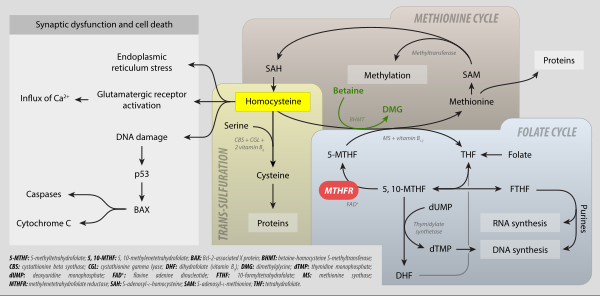5,10-Methylenetetrahydrofolate (original) (raw)
From Wikipedia, the free encyclopedia
5,10-Methylenetetrahydrofolate
 |
|
|---|---|
| Names | |
| IUPAC name _N_-[4-(3-amino-1-oxo-1,4,5,6,6a,7-hexahydroimidazo[1,5-f_]pteridin-8(9_H)-yl)benzoyl]-L-glutamic acid | |
| Other names5,10-CH2-THF,MTHF | |
| Identifiers | |
| CAS Number | 3432-99-3  Y Y |
| 3D model (JSmol) | Interactive image |
| ChEBI | CHEBI:20502  Y Y |
| ChEMBL | ChEMBL117348  Y Y |
| ChemSpider | 97272  Y Y |
| MeSH | 5,10-methylenetetrahydrofolate |
| PubChem CID | 108194 |
| UNII | 0SXY5ET48B  Y Y |
| CompTox Dashboard (EPA) | DTXSID90955873 |
InChI InChI=1S/C20H23N7O6/c21-20-24-16-15(18(31)25-20)27-9-26(8-12(27)7-22-16)11-3-1-10(2-4-11)17(30)23-13(19(32)33)5-6-14(28)29/h1-4,12-13H,5-9H2,(H,23,30)(H,28,29)(H,32,33)(H4,21,22,24,25,31)/t12?,13-/m0/s1  YKey: QYNUQALWYRSVHF-ABLWVSNPSA-N YKey: QYNUQALWYRSVHF-ABLWVSNPSA-N  YInChI=1/C20H23N7O6/c21-20-24-16-15(18(31)25-20)27-9-26(8-12(27)7-22-16)11-3-1-10(2-4-11)17(30)23-13(19(32)33)5-6-14(28)29/h1-4,12-13H,5-9H2,(H,23,30)(H,28,29)(H,32,33)(H4,21,22,24,25,31)/t12?,13-/m0/s1Key: QYNUQALWYRSVHF-ABLWVSNPBB YInChI=1/C20H23N7O6/c21-20-24-16-15(18(31)25-20)27-9-26(8-12(27)7-22-16)11-3-1-10(2-4-11)17(30)23-13(19(32)33)5-6-14(28)29/h1-4,12-13H,5-9H2,(H,23,30)(H,28,29)(H,32,33)(H4,21,22,24,25,31)/t12?,13-/m0/s1Key: QYNUQALWYRSVHF-ABLWVSNPBB |
|
| SMILES O=C(O)[C@@H](NC(=O)c1ccc(cc1)N4CC3N(C=2C(=O)/N=C(/N)NC=2NC3)C4)CCC(=O)O | |
| Properties | |
| Chemical formula | C20H23N7O6 |
| Molar mass | 457.44 g/mol |
Except where otherwise noted, data are given for materials in their standard state (at 25 °C [77 °F], 100 kPa).  N verify (what is N verify (what is  Y Y N ?) Infobox references N ?) Infobox references |
Chemical compound
5,10-Methylenetetrahydrofolate (N5,N10-Methylenetetrahydrofolate; 5,10-CH2-THF) is cofactor in several biochemical reactions. It exists in nature as the diastereoisomer [6R]-5,10-methylene-THF.
As an intermediate in one-carbon metabolism, 5,10-CH2-THF converts to 5-methyltetrahydrofolate, 5-formyltetrahydrofolate, and methenyltetrahydrofolate. It is substrate for the enzyme methylenetetrahydrofolate reductase (MTHFR)[1][2] It is mainly produced by the reaction of tetrahydrofolate with serine, catalyzed by the enzyme serine hydroxymethyltransferase.
Formaldehyde equivalent
[edit]
Methylenetetrahydrofolate is a source of the equivalent of formaldehyde or CH22+ in biosyntheses.
Methylenetetrahydrofolate is also an intermediate in the detoxification of formaldehyde.[3]
Pyrimidine biosynthesis
[edit]
It is the one-carbon donor for thymidylate synthase, for methylation of 2-deoxy-uridine-5-monophosphate (dUMP) to 2-deoxy-thymidine-5-monophosphate (dTMP). The coenzyme is necessary for the biosynthesis of thymidine and is the C1-donor in the reactions catalyzed by TS and thymidylate synthase (FAD).
[6R]-5,10-methylene-THF is a biomodulator that has proven to enhance the desired cytotoxic antitumor effect of Fluorouracil (5-FU) and can bypass the metabolic pathway required by other folates (such as leucovorin) to achieve necessary activation.[4] The active metabolite is being evaluated in clinical trials for patients with colorectal cancer in combination with 5-FU.
MTHFR metabolism: folate cycle, methionine cycle, trans-sulfuration and hyperhomocysteinemia. 5-MTHF: 5-methyltetrahydrofolate; 5,10-methylenetetrahydrofolate; BAX: Bcl-2-associated X protein; BHMT: betaine-homocysteine S-methyltransferase; CBS: cystathionine beta synthase; CGL: cystathionine gamma-lyase; DHF: dihydrofolate (vitamin B9); DMG: dimethylglycine; dTMP: thymidine monophosphate; dUMP: deoxyuridine monophosphate; FAD+ flavine adenine dicucleotide; FTHF: 10-formyltetrahydrofolate; MS: methionine synthase; MTHFR: methylenetetrahydrofolate reductase; SAH: S-adenosyl-L-homocysteine; SAME: S-adenosyl-L-methionine; THF: tetrahydrofolate.
- ^ "Entrez Gene: MTHFR methylenetetrahydrofolate reductase (NAD(P)H)".
- ^ Födinger M, Hörl WH, Sunder-Plassmann G (2000). "Molecular biology of 5,10-methylenetetrahydrofolate reductase". J Nephrol. 13 (1): 20–33. PMID 10720211.
- ^ Marx, C. J.; Chistoserdova, L.; Lidstrom, M. E. (2003). "Formaldehyde-detoxifying role of the tetrahydromethanopterin-linked pathway in Methylobacterium extorquens AM1". J. Bacteriol. 185 (24): 7160–8. doi:10.1128/jb.185.23.7160-7168.2003. PMC 296243. PMID 14645276.
- ^ Danenberg, Peter V.; Gustavsson, Bengt; Johnston, Patrick; Lindberg, Per; Moser, Rudolf; Odin, Elisabeth; Peters, Godefridus J.; Petrelli, Nicholas (2016-10-01). "Folates as adjuvants to anticancer agents: Chemical rationale and mechanism of action". Critical Reviews in Oncology/Hematology. 106: 118–131. doi:10.1016/j.critrevonc.2016.08.001. ISSN 1879-0461. PMID 27637357.
